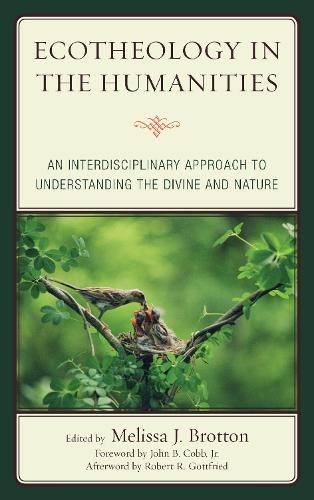
Ecotheology in the Humanities: An Interdisciplinary Approach to Understanding the Divine and Nature
(Paperback)
Available Formats
Publishing Details
Ecotheology in the Humanities: An Interdisciplinary Approach to Understanding the Divine and Nature
By (Author) Melissa Brotton
Foreword by John Cobb Jr.
Contributions by Ellen Bernstein
Contributions by Ginger Hanks Harwood
Contributions by John Gatta
Contributions by Ron Jolliffe
Contributions by David J. Kendall
Contributions by Young-Chun Kim
Contributions by Samuel McBride
Contributions by Mick Pope
Bloomsbury Publishing PLC
Lexington Books
23rd May 2018
United States
Classifications
Professional and Scholarly
Non Fiction
Theology
Religion and science
Social impact of environmental issues
Literary studies: general
261.88
Physical Properties
Paperback
300
Width 152mm, Height 220mm, Spine 21mm
404g
Description
This book is a collection of essays about the interaction between God, humans, and nature in the context of the environmental challenges and Biblical studies. Chapters include topics on creation care and Sabbath, sacramental approaches to earth care, classical and medieval cosmologies, ecotheodicy, how we understand the problem of nonhuman suffering in a world controlled by a good God, ecojustice, and how humans help to alleviate nonhuman suffering. The book seeks to provide a way to understand Judeo-Christian perspectives on human-to-nonhuman interaction through Biblical, literary, cultural, film, and music studies, and as such, offers an interdisciplinary approach with emphasis on the humanities, which provides a broader platform for ecotheology.
Reviews
This book is like a breath of fresh air. Many ecotheologians have begun to pay more attention to literature of wider relevance, including agrarian writers such as Aldo Leopold and Wendell Berry. What has not yet happened, and what this book beautifully illustrates, is that those working in the environmental humanities are able to make a vitally important contribution to ecotheology. I fully endorse the premise of this book that it is high time for a much richer trans-disciplinary conversation to take place and for those in the environmental humanities to wake up to the resources embedded in religious and explicitly ecotheological literature. As this is worked out in practice, some brilliantly original elements come to the surface and take the field forward in new ways. The inclusion of the importance of music, for example, is rarely if ever discussed in ecotheology literatures. This book will be fascinating both for those beginning to encounter this field and the seasoned scholar. -- Celia Deane-Drummond, professor of theology, University of Notre Dame
I am in love with this timely and ground-breaking book for the way it combines incisive thinking and beauty of expression; for a vocabulary that includes eco-theology, eco-theodicy, eco-missiology, and eco-esthetics; for the competent voices speaking from the vantage point of theology, biblical studies, music, poetry, literature, and film; and for leading us to a culture of life and plenitude in theory and practice. -- Sigve K. Tonstad, Loma Linda University
Author Bio
Melissa Brotton is assistant professor of English and communications at La Sierra University.
